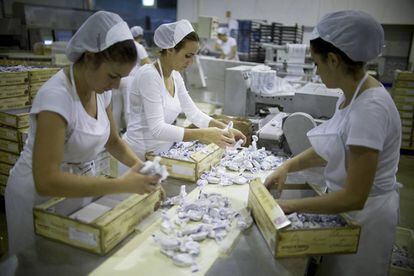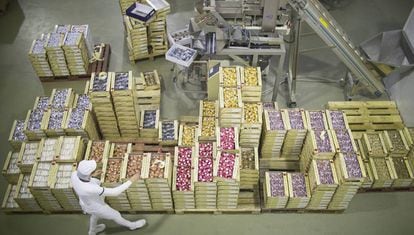The sweet smell of success: Spain’s crisis-busting Christmas town
How one industry saved town of Estepa from financial ruin while providing jobs for local women

Today Micaela Ruiz Téllez would be considered the founder of a successful startup. But in the mid 19th century she was just a clever woman who slaughtered pigs for the important families of Estepa, a town in central Andalusia. One day, she came up with an idea that would lead to a business and see her name added to the history books as a pioneer of an industry that is still booming today.

Ruiz thought that her husband, who transported goods to the city of Cordoba, could sell the sweets that she made with the lard left over from her other job. The main hurdle though, was that the sweets got hard quickly. So after some experimentation, she realized that if she dried out the flour, the sweets would be hard on the outside and tender on the inside—perfect for transportation. It was with that that one of Spain’s favorite sweets, the mantecado, was born.
Today in Estepa, where 22 similar businesses have popped up, everyone knows the story of Ruiz’s ingenuity. In the town with a population of around 12,600, around 4,500 are currently employed in the Christmas sweets industry. Annually Estepa produces around 20,000 tons of Christmas sweets, bringing in sales of some €80 million, according to the council that regulates the trademark local products.
In Estepa we’re born with this smell. Starting in summer, just walking around it’s like eating a whole mantecado Sweets factory employee Pilar Espinosa
Estepa is just one of the Spanish towns that make a living off of special Christmas sweets. Medina Sidonia in Cádiz, Jijona in Alicante, and Sonseca in Toledo are other examples of where the lucrative industry has taken off.
In Spain, Christmas dinners and lunches are usually accompanied by purchased Christmas sweets. Besides mantecado, a baked biscuit that can feature cinnamon, almonds and chocolate, there are also polvorones, a type of Spanish shortbread, turrones, similar to nougat, usually featuring nuts, and marzipan. All have their origins in centuries-old recipes, but have been industrialized without losing their artisanal character. According to the Infoempresa business database, the top 32 turrón manufactures are experiencing business growth, and last year they sold produce worth €440 million.
Beyond just making sweets, these towns have all reaped the benefits of becoming tourist attractions. People flock from all over to buy boxes of fresh sweets, learn how they’re made and get into the Christmas spirit.
Crisis, what crisis?
The streets of Estepa start to smell like lard, cinnamon and sesame seeds halfway through the month of August. That’s when the frenetic activity starts, and it lasts until the end of December with the town’s 22 factories operating long enough hours for three shifts of workers to come in.
This year, the town’s mayor, Salvador Martin, hopes that production will increase by 5%. During the second half of the year, he said, the unemployment rate usually slides from 15% to 7%. Spain’s overall unemployment rate is 18.9%, according to third quarter figures.
“The mantecado is one of the economic bases of the region and during these months we even reach full employment,” said Martin.

“In Estepa we’re born with this smell. Starting in the summer, just by strolling around town, just breathing in the smell, it’s like you’ve eaten a whole mantecado,” said Pilar Espinosa, 38, who has been working with the Enrique Moreno company for 20 years.
Women – who have been especially affected by Spain’s crippling economic crisis – represent most of the workers in Estepa’s sweets industry. Enrique Moreno, who leads of a Christmas sweets company that bears his name, said that in his business about 85% of the workers are women.
As José María Fernández, secretary of the Regulatory Council for Mantecados and Polvorones, explained: “It’s a tradition in Estepa. Some people say it’s because women’s work is more delicate but others point to its origin, and the fact that it was started by a woman.”
English version by Alyssa McMurtry.












































